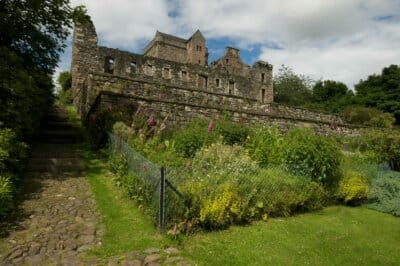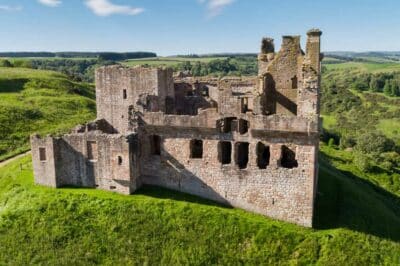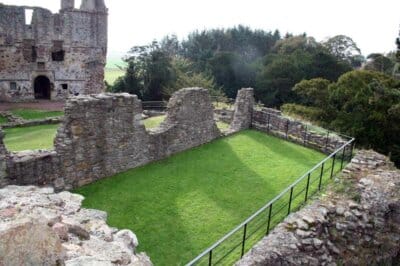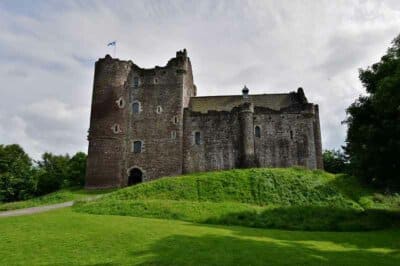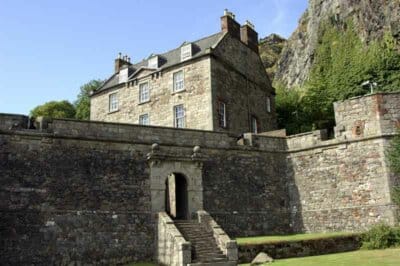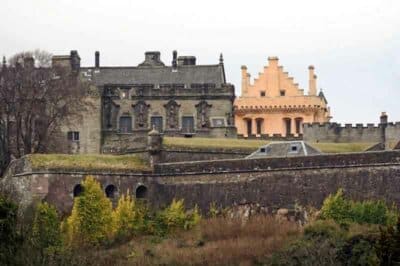Urquhart Castle was once a powerful symbol of power and authority in northern Scotland.
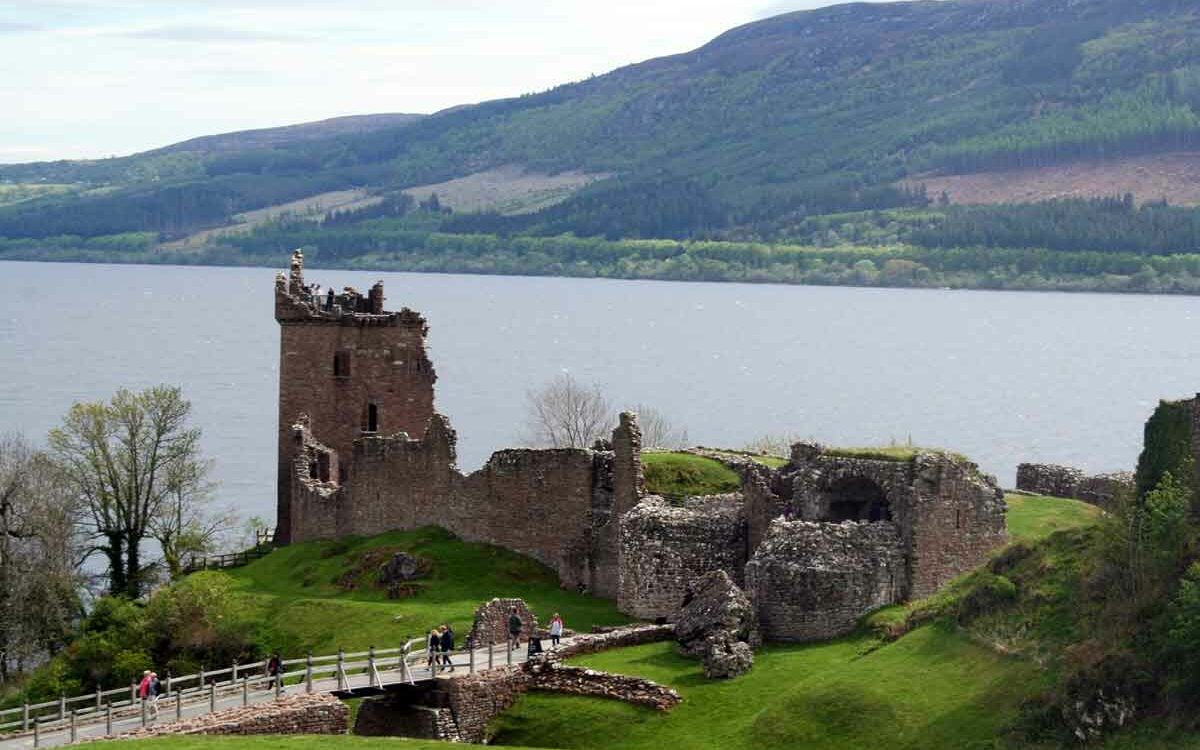
The castle sits in a beautiful location on the shores of Loch Ness around 18 miles from the Highland capital Inverness.
Loch Ness, perhaps the most famous of Scotland’s lochs, is one of a number of rivers and lochs which form part of the Great Glen a geological fault line stretching from the Atlantic to the North Sea.
The Great Glen has always been a vital highway allowing the movement of people and goods in times of peace and war.
This geological fault line provides a natural route for traffic on the Caledonian Canal and the main A82 road linking Fort William and Inverness.
With the chance that Loch Ness’s best-known resident ‘Nessie’ might make an appearance, it’s unsurprising that Urquhart Castle is one of Scotland’s top visitor attractions.
The views over the loch from the Grant Tower, the best-preserved part of the castle, are quite magnificent.
Urquhart Castle: history
The first mention of Urquhart Castle comes from a hagiographical account of the Life of St Columba, by the remarkable Adomnan, Abbot of Iona between 679 and 704.
Adomnan’s chronicle tells of St Columba’s travels in the Great Glen and his visit to the court of Bridei (Brude) a man described by the Venerable Bede as a, “very powerful king [of Picts].”
While Adomnan was unable to pinpoint its exact location it’s now thought to have been on Castle Hill in modern Inverness rather than Urquhart as some historians first believed.
Some contemporary scholars now agree that Urquhart was more likely to have been the home of Emchath a Pictish nobleman.
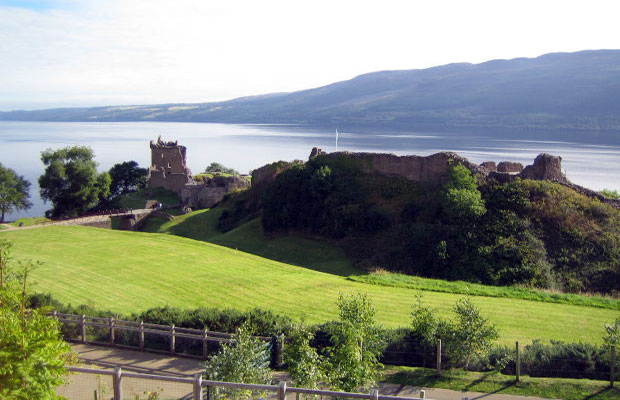
According to Adomnan, Columba stopped en route at Airdchartdan (Urquhart) to baptise a local family.
Certainly, Historic Environment Scotland (HES) which manages the property agrees, citing Adomnan’s story of St Columba’s baptism of Emchath – a dying man – and his family at a place called Airchartdan, assumed to be Urquhart – a name which means by the wood or thicket.
Adomnan notes that following the baptism, Emchath “gladly and confidently departed to the Lord.”
However, despite later Pictish archaeological finds at Urquhart, no definitive proof of the saint’s visit exists.
Other evidence reinforces the Pictish connection with the area – the discovery of part of a penannular brooch, Pictish place names in Glen Urquhart and a Pictish burial ground close to the castle site.
Of course no story of Loch Ness is complete without mention of the ‘monster’ and Adomnan gladly obliges.
He wrote, “When the blessed man stayed for some days in the land of the Picts he had to cross the River Ness.
When he reached its bank he saw some of the local people burying a poor fellow. They said they had seen a water beast snatch him and maul him savagely…”
It’s an intriguing tale!
Much more evidence of life at the castle during the 13th and 14thcenturies remains.
We know for example that around 1230, King Alexander II granted the Urquhart estate to Sir Thomas le Durward and later it was his son Alan who built the first castle.
The name Durward is derived from the honorific position of king’s usher or door ward given during William the Lion’s reign (1165-1214) in recognition of the family’s role in suppressing Guthred MacWilliam’s rising of 1212.
While HES accept that Urquhart could have been part of an existing estate, radiocarbon dating points to the construction of the first castle between 1030 and 1280.
There was no evidence which indicated there was an earlier fortification when Durward took control.
Taking advantage of the natural topography, Durward began the construction of a stone castle with a shell keep, a strong stone structure encircling the highest part of the promontory. It may have included a small stone tower on one side.
Later archaeological excavations of the shell keep revealed a considerable amount of material suggesting that the buildings were abandoned in haste during one of the many turbulent medieval periods.
Although relatively unknown today Durward, who married Marjory, Alexander’s illegitimate daughter, initially exercised considerable authority. Around 1244 he took the office of Justiciar of Scotland, previously under Comyn control.
The Comyns (Cummings) were a powerful Anglo-Norman family whose story is inextricably linked to Urquhart and the wider Scottish narrative.
Robert the Bruce and William Wallace
Rivals of Robert the Bruce and William Wallace and often labeled traitors and kidnappers they have consistently had a ‘bad press’. Theirs is a fascinating story but one for another day.
As in many cases of nobles seeking to increase their power, Durward’s ambition outweighed his ability to control people and events around him, particularly his ongoing feud with the Comyns.
Alan Young, writing in the Oxford Dictionary of National Biography suggests simply that between 1249 and 1251 Durward did not carry enough authority over the Scottish nobility.”
He was forced into exile in England in July 1252, becoming known as one of Henry III’s, “beloved friends.” While he did make a limited ‘comeback’ to Scottish politics he faded from view after 1268.
The Melrose Chronicle
Inevitably opinions on Durward varied considerably. The Melrose Chronicle, which took a pro-Comyn stance, said he was, “master builder of the whole mischief.”
The chronicler Walter Bower took an opposing view. Bower said he was…
“a generous man extremely vigorous in arms and most faithful to king and kingdom.”
Melrose Chronicle
Durward died in 1275 and without a male heir the castle reverted to the crown and Alexander III granted it to John Comyn, Lord of Badenoch and Lochaber.
Comyn added considerably to the fortifications with the construction of the curtain wall around the promontory and the impressive gatehouse at the castle entrance.
In 1286 Alexander III died in an accident leaving his three year old granddaughter Margaret of Norway as the only heir.
In a solution which envisaged a joint Anglo-Scottish monarchy, Margaret was betrothed to Edward, son of Edward I of England. Sadly the young girl died on her way to Scotland for her inauguration in 1290.
With a real prospect of civil war Scotland was temporarily governed by a group, appointed by parliament, of leading nobles and churchmen known collectively as the Guardians.
With no other heirs, 13 nobles came forward to claim the throne and the Guardians turned to Edward to help examine their entitlement.
Eventually John Balliol, Lord of Galloway, who had Comyn family connections, and Robert Bruce, Lord of Annandale became the two main claimants. In the end John Balliol was crowned king in November 1292.
In a reign bedeviled by Edward’s insistence of overlordship the turning point came when he demanded that Scotland took up arms against the French.
With France the chief source of Scotland’s foreign revenue from wool sales it was politically impossible for Balliol to agree.
Very aware of Edward’s formidable military power, the Scots and French signed the Auld Alliance an agreement built on their shared need to curtail English expansion.
SCOTTISH WARS OF INDEPENDENCE
Balliol’s defiance brought immediate retaliation from a furious Edward and the long Wars of Independence began. His army swept through Scotland sacking Berwick and defeating a Scot’s army at Dunbar in 1296. John Balliol was deposed and Scotland became a land, “subject to the English crown.” Many of Scotland’s great castles were taken – Urquhart among them.
While the history of the Urquhart Castle prior to 1296 is often a matter of scholarly debate, the arrival of an English army brought unambiguous evidence of its existence.
As the rebellion against Edward gathered pace Sir Andrew Murray (Moray) assumed leadership of the campaign against Edward which began in May 1297 with an abortive attempt to wrestle Urquhart from the English.
However, within months the forces of Murray and William Wallace defeated an English army at the Battle of Stirling Bridge.
Sir William FitzWarine constable of Urquhart Castle wrote to Edward, “On Monday morning Andrew de Moray and Alexander Pilchys with their abettors besieged the castle. In a night assault, William Puer and the writer’s son were killed. The besiegers then drew off.”
It marked the start of a turbulent period for Urquhart with frequent attacks and changes in custody. By 1303 the castle was back in Scottish hands, if only for a short time.
The following year the Comyns negotiated peace with Edward who installed Sir Alexander Comyn of Badenoch as the constable of Urquhart Castle.
In February 1306, Robert Bruce the grandson of John Balliol’s rival, murdered John Comyn in Dumfries and after Edward’s death the following year stepped up his feud with the Comyns. As his campaign gained momentum, Comyn castles including Urquhart fell.
Following his coronation at Scone, Bruce granted Urquhart to his nephew Thomas Randolph, the first earl of Moray as a reward for his support.
When the king died in 1329 Randolph became regent to his young son David II.
It’s believed that in the summer months of 1342, David was the only king of Scots who actually spent time in the castle. Not much is known about his visit although it’s likely he hunted in the nearby royal forest of Cluny.
Whatever the purpose of his visit he brought an impressive retinue with him. Among them were bishops Moray and Ross and lords, Sir John de Kerdale and Sir William de Moubray.
When finally the Wars of Independence were over, Urquhart was held for the crown by a chain of constables responsible for the castle’s security in the monarch’s absence.
Among them, most notably was Sir Robert de Lauder, a prominent Scottish soldier who kept the English at bay in 1334.
The Wolf of Badenoch
When Robert II took the Scottish throne in 1371, Urquhart passed to his fourth son David, Earl of Strathearn before his elder brother Alexander Stewart, Earl of Buchan took the reins in 1384.
Buchan – the Wolf of Badenoch – is today remembered as one of Scotland’s most unsavoury characters.
His tenure at Urquhart Castle brought great change. Despite his unpleasant reputation, it seems that he had a good relationship with his constables and considerable redevelopment of the building was carried out.
It was however the death of Buchan’s wife Euphemia, Countess of Ross which heralded the next phase of Urquhart’s history.
Macdonald Lordship of the Isle
Enter the Macdonald Lordship of the Isles – a powerful force, independent of the Scottish king which controlled large parts of western Scotland.
With Euphemia’s death, they wanted control of the earldom of Ross which included great swathes of territory north of the Great Glen.
Over the next century or so, despite attempts to bring crown and lordship together, Urquhart and the earldom of Ross changed hands a number of times in what was a tumultuous period of history.
Eventually, in 1476, the Urquhart estate and its castle passed to George Gordon the powerful 2nd earl of Huntly.
Huntly’s arrival did not bring the hoped for peace, on the contrary, squabbling with Clan Donald and their allies the Macleans continued to blight life in the glens.
Eventually Huntly leased Urquhart to Sir Duncan Grant of Freuchie and in time his grandson John known as the ‘Red Bard’ although nothing is known about his poetry, took control.
In 1509, James IV, perhaps relieved that things were relatively peaceful, granted the lordship to the Grant family.
But there were conditions attached to the charter including a command that Grant should, “repair or build at the castle a tower with an outwork of stone and lime for protecting the lands and the people from the inroads of thieves and malefactors.”
The resulting five storied tower built at the northern end of the promontory, on the site of the original donjon, contained a number of private rooms for the lord, additional bedrooms, a kitchen and storage space.
Urquhart Castle: Grant Tower
Despite the collapse of part of the tower in a violent storm in February 1715, a fair amount of the Grant Tower still survives today; it’s certainly Urquhart Castle’s most recognizable feature.
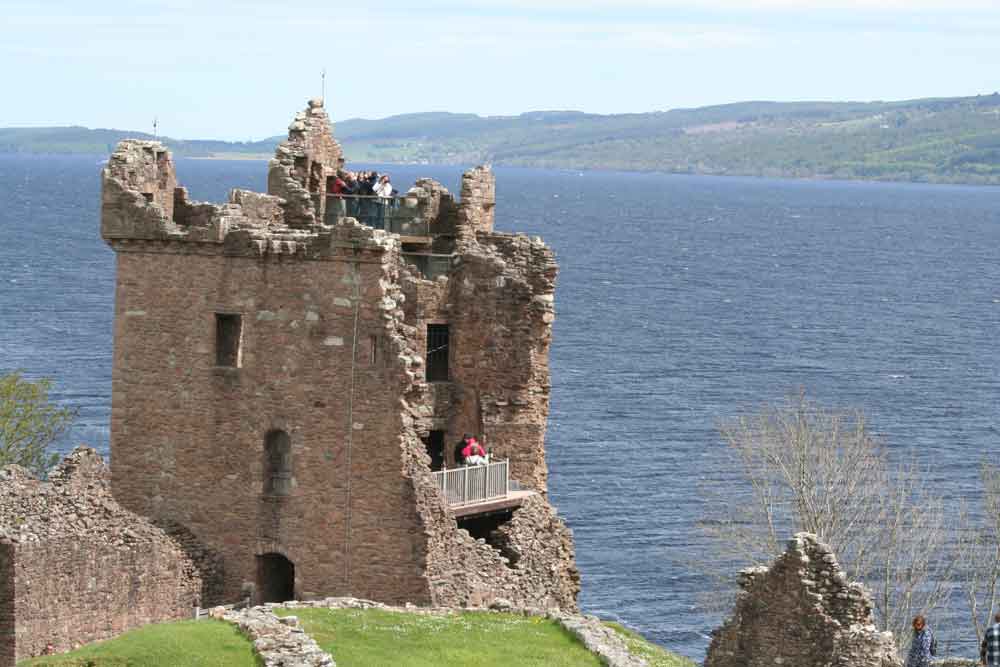
The death of James IV at Flodden in 1513, left Scotland with an infant king James V the father of Mary Queen of Scots and the county wringing its hands in despair.
The ensuing turmoil emboldened Donald MacDonald of Lochalsh who attacked Urquhart on a number of occasions.
In 1545, the MacDonalds once again fell on Urquhart killing and looting. As it turned out, thanks to the records kept by James Grant who succeeded in 1528, it was the best documented of all Highland raids.
Records show that among the spoils were: 3 great boats, 3,377 sheep, 122 swine, 3,206 bolls of oats, 12 feather beds with bolsters, blankets and sheets, 20 artillery pieces and a multitude of other items – anything portable of any value.
This was the final appearance of the MacDonalds at Urquhart Castle although the Grants weren’t to know that. Work to repair the damage began and an uneasy calm settled on the glen.
As Christmas 1644 approached there was little cheer or goodwill at Urquhart.
The Wars of the Three Kingdoms continued relentlessly and the castle was under attack, this time by Covenanter forces from Inverness aggrieved at the laird’s decision not to endorse the Solemn League and Covenant.
Once again the fortress was looted leaving only a few items of furniture behind prompting the laird to complain that the castle was…
“without any kind of uther wairis, pleneishing, goodis or geir whatsumever… except allenarlie [only] bare walls.”
Unknown
As Scotland adjusted to the installation of the Protestant joint monarchs of William and Mary who arrived from Holland in 1689, the garrison at Urquhart was unsuccessfully besieged by a Jacobite force under MacDonell of Glengarry.
When the soldiers finally left two years later they destroyed much of Urquhart Castle which then slowly further deteriorated to become, in the words of Historic Environment Scotland, “a noble ruin in a majestic setting.”
After the death of the final owner, Caroline Dowager of Seafield, responsibility for the Urquhart Castle’s care was transferred to the state on 6 October 1913.
Note: Lord of the Isles
The Lord of the Isles was a title that first appeared when John of Islay wrote to King Edward III of England, signing the letter “Dominus Insularum” the Lord of the Isles.
Urquhart Castle visitor information
For information on opening hours, cost of entry and other tips to help you plan your visit, go to the official castle website.
